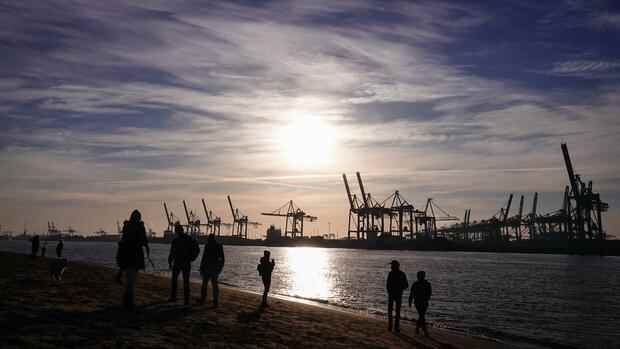Most economic researchers assume that the German economy will contract slightly towards the end of the year.
(Photo: dpa)
Berlin The prospects for German companies appear to be improving. The massive delivery bottlenecks are still holding back the economic recovery. But there are the first signs of gradual improvement.
This is supported by the fact that exports from Germany rose by 4.1 percent in October compared to the previous month and imports were five percent higher. The Federal Statistical Office announced this on Thursday.
Compared to February 2020, the month before the start of the corona pandemic in Germany, exports were 3.8 percent and imports 13.5 percent higher.
The production of German companies has also increased recently. In October this was 2.8 percent higher than the previous month – the strongest increase in production in a year. This was primarily due to the comeback of the automotive industry, which was long hampered by missing parts, especially microchips: it increased production by 12.6 percent.
Top jobs of the day
Find the best jobs now and
be notified by email.
However, the majority of German companies in almost all industries are still complaining of persistent delivery bottlenecks. Many companies had cut back their production due to the pandemic, fewer raw materials were extracted. Then the demand rose suddenly, for which the transport capacities are insufficient.
More exports, but fewer new orders
On top of that, there are still corona restrictions in the movement of goods. Overload broke out in world trade and this continues to this day. Despite the high demand, the supply cannot keep up. That restricts growth. Most economic researchers assume that the German economy will even shrink slightly as a result of the year-end.
The hope is that as the supply chain problems gradually ease, the upswing will become even stronger in the coming year. The new figures on imports, exports and production are likely to be the first signs of this.
“The strong increase in exports and imports in October increases the chances that the German economy will be able to avoid a mini-recession due to the fourth corona wave at the turn of the year,” says Sebastian Dullien, Director of the Institute for Macroeconomics and Business Cycle Research (IMK). Because the company’s order books have so far been full, but it just couldn’t keep up with production.
However, it is questionable whether the high demand will actually last that long. In October, German industrial companies received 6.9 percent fewer orders. Economists had only expected a slight decline. Jens-Oliver Niklasch from Landesbank Baden-Württemberg warns that the development is a “warning shot against the bow of the economy”.
Incoming orders often reflect the future course of the economy well. However, the decline was mainly the result of a lack of major orders. Without this, incoming orders had even risen slightly in October.
More: Economists urge government to act quickly on climate protection and pandemics


